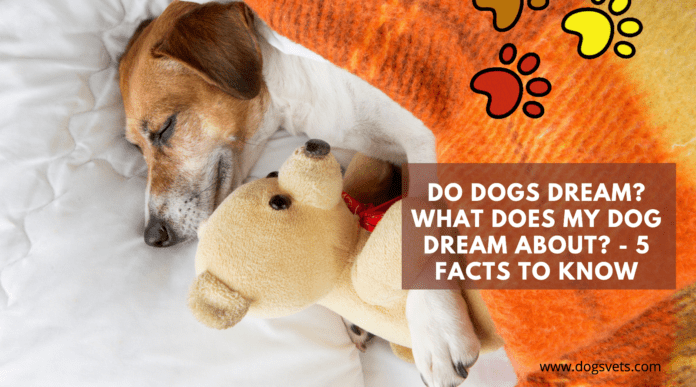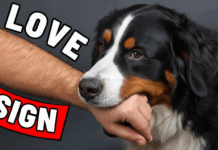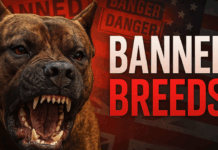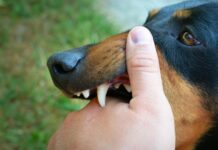Last Updated on September 20, 2024 by Dogs Vets
Do Dogs Dream? Understanding Canine Dreams
Have you ever noticed your dog twitching, moving their legs, or making soft noises while asleep? These signs suggest that your furry friend is dreaming. Dogs do dream, much like humans, and understanding their dreams can provide valuable insights into their behavior and well-being.
This comprehensive guide explores what dogs dream about, how often they dream, whether their breed affects their dreams, and how you can recognize and manage your dog’s dreaming patterns.
Understanding Canine Dreams
Canine dreams occur during the Rapid Eye Movement (REM) phase of sleep, similar to humans. During this stage, a dog’s brain is active, processing memories and experiences from the day. Scientists have studied the brain activity of dogs during sleep and found patterns that indicate dreaming. While we can’t know exactly what dogs dream about, research suggests that their dreams are often related to their daily activities and instincts.
Reference: American Veterinary Medical Association – Canine Sleep Patterns
What Do Dogs Dream About?
Dogs’ dreams typically reflect their daily activities and natural instincts. Common themes include:
- Playing and Running: Many dogs dream about playing fetch, running in the park, or interacting with other dogs.
- Hunting and Exploring: Breeds with strong hunting instincts may dream about chasing prey or exploring new territories.
- Training and Commands: Dogs who undergo regular training might dream about obeying commands or performing tricks.
- Social Interactions: Interactions with their human family members or other animals often feature in their dreams.
- Protective Behaviors: Guard dogs may dream about protecting their territory or family from perceived threats.
Reference: PetMD – What Do Dogs Dream About?
How Often Do Dogs Dream?
The frequency and duration of dog dreams vary based on factors such as age, breed, and activity level. On average:
- Frequency: Dogs enter the REM stage multiple times during their sleep cycle, typically 2-3 times per hour.
- Duration: Each REM cycle lasts about 5-20 minutes, meaning dogs can spend a significant portion of their sleep dreaming.
- Age Influence: Puppies and older dogs tend to dream more frequently due to their active and evolving minds.
Reference: The Spruce Pets – How Often Do Dogs Dream?
Does a Dog’s Breed Affect Its Dreams?
Yes, a dog’s breed can influence the content and frequency of their dreams. Breeds with specific instincts and activities are more likely to dream about related actions. For example:
- Herding Breeds (e.g., Border Collies): May dream about herding livestock or engaging in training exercises.
- Hunting Breeds (e.g., Labrador Retrievers): Likely to dream about retrieving objects or chasing game.
- Guard Breeds (e.g., German Shepherds): May dream about protecting their home and family.
Additionally, smaller breeds tend to have shorter and more frequent dreams, while larger breeds may have longer but less frequent dreaming sessions.
Reference: American Kennel Club – Breed-Specific Behaviors
Recognizing When Your Dog is Dreaming
Identifying when your dog is dreaming can help you understand their behavior during sleep. Common signs include:
- Twitching Legs: Mimicking running or playing.
- Moving Tail or Ears: Reflecting excitement or alertness in dreams.
- Soft Whining or Barking: Vocalizing dreams.
- Body Movements: Rolling, pawing, or stretching as they navigate their dream world.
Can Dogs Have Nightmares?
Just like humans, dogs can experience nightmares. Nightmares in dogs may be triggered by:
- Traumatic Experiences: Past injuries or frightening events.
- Anxiety and Stress: Changes in the household or routine.
- Loud Noises: Thunderstorms, fireworks, or construction sounds.
Signs of a nightmare include intense twitching, vocalizing loudly, or appearing distressed during sleep. If your dog frequently has nightmares, it may be beneficial to consult with a veterinarian or a professional dog behaviorist.
Reference: PetMD – Do Dogs Have Nightmares?
Managing Your Dog’s Sleep and Dreams
Ensuring your dog has a healthy sleep environment can promote positive dreaming and overall well-being. Tips include:
- Consistent Routine: Establish regular sleep and wake times.
- Comfortable Bedding: Provide a cozy and quiet place for your dog to sleep.
- Adequate Exercise: Ensure your dog gets enough physical and mental stimulation during the day.
- Calming Aids: Consider using calming supplements or products if your dog experiences anxiety.
Reference: American Humane – Helping Your Dog Sleep Well
Frequently Asked Questions (FAQ)
1. Do all dogs dream?
Yes, all dogs experience dreams during their sleep cycles. While the content and frequency of their dreams may vary based on factors like breed, age, and activity level, dreaming is a natural part of a dog’s sleep process.
2. How can I tell if my dog is dreaming?
Common signs that your dog is dreaming include twitching legs, moving tail or ears, vocalizations like whining or barking, and various body movements such as rolling or pawing.
3. Can dreaming affect my dog’s behavior?
Generally, dreaming does not negatively affect a dog’s behavior. However, if your dog frequently experiences nightmares, it may lead to signs of anxiety or stress. In such cases, consulting a veterinarian is recommended.
4. Should I wake my dog if they are dreaming?
It’s best to let your dog continue sleeping if they are dreaming. Waking them abruptly may startle them and disrupt their sleep cycle. If your dog seems distressed during a dream, gently calling their name can help them wake up without causing panic.
5. Do puppies and senior dogs dream differently than adult dogs?
Yes, puppies and senior dogs tend to dream more frequently and have longer dream durations compared to adult dogs. This is likely due to their developing and aging brains, which process more experiences and memories.
Conclusion
Dogs do dream, and their dreams are a reflection of their daily activities, instincts, and emotions. Understanding your dog’s dreaming patterns can enhance your bond and provide insights into their behavior and well-being.
By recognizing the signs of dreaming, acknowledging the content of their dreams, and ensuring a healthy sleep environment, you can support your dog in enjoying restful and positive dreams. Always consult with a veterinarian if you have concerns about your dog’s sleep patterns or dream-related behaviors to ensure their overall health and happiness.
References and Further Reading
- American Veterinary Medical Association – Canine Influenza
- Centers for Disease Control and Prevention – Canine Influenza
- World Organisation for Animal Health – Canine Influenza
- PetMD – Canine Influenza Symptoms and Treatment
- American Kennel Club – Canine Influenza
- VCA Hospitals – Canine Influenza
- PetMD – Diagnosing Canine Influenza
- PetMD – Canine Influenza Vaccine
- American Kennel Club – Understanding Breed-Specific Behaviors
- The Spruce Pets – How Often Do Dogs Dream?
- American Humane – Helping Your Dog Sleep Well
- PetMD – Do Dogs Have Nightmares?
Facts Check
We hope you enjoyed this article… What are your thoughts? Рleаse feel free to share with us in the comments section below!

















